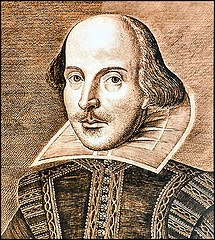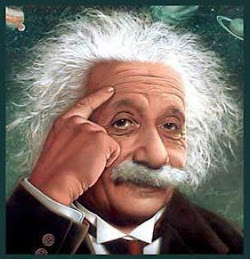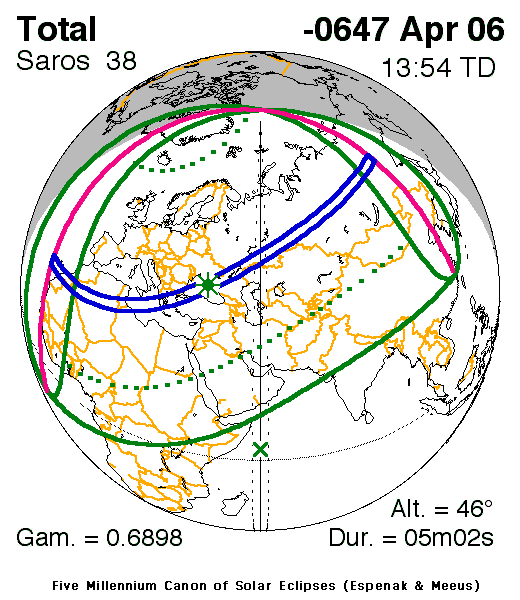Art wrote:
I have made quite a few logical arguments;
I think that even Ann would agree about that.
You have, Art. But more than that, you have made me think about two questions:
1) Does it matter if the works of Shakespeare were written by the man from Stratford or by the man from Oxford?
2) Why are so many people (myself included) so attached to the idea of Shakespeare that we have grown up with?
3) What did that video by Roland Emmerich, "10 Reasons", really try to tell us?
Let me start by the second question. Why are many of us so fond of the following people (or "people")?
Personally, I think that very many of us like the above "people" so much because they are icons belonging to a large international cultural heritage. These icons are far more than characters. They are caricatures, and still more, they are symbols. We can navigate through the wilderness of reality by finding our position in relation to these cultural lighthouses. These symbols are complete with a perfectly well-known appearance and a set of well-defined characteristics, which may or may not have had much to to with the actual person who once bore their names. Please note that four of the five persons here are dead, and the fifth was never alive. Therefore their appearances and their characteristics are set in stone. They are unchanging and "safe" in a stormy and uncertain reality.

Shakespeare, too, is one of these immortal cultural icons. We know his name, William Shakespeare, his appearance - he looked like that, didn't he? - and we know when he lived and died and where he was born, which was in Stratford. And we know that he was the greatest writer ever known because he made Hamlet say "To be or not to be", and he created Romeo and Juliet, too. And we know that if we quote Shakespeare when we say something, our words will seem to be "more true" because we are quoting Shakespeare. Do we need to know more about Shakespeare? No, this is exactly how much we need to know in order to make Shakespeare one of those unchanging bastions of reality with whose help we navigate through our own uncertain existence.
But two of the cultural symbols here have produced works that should be regarded as more important than even their own symbolic importance, or so I think anyway. Isn't the theory of general relativity worth more than Einstein? Isn't the fact that our understanding of the universe has increased so enormously through general relativity worth more than the fact that Einstein has become a shaggy-haired symbol of absolute genius?
Similarly, aren't the
works of Shakespeare worth more, to us at least, than the man who actually wrote them? What does it really matter if their author was actually the 17th Earl of Oxford? Does that add or detract from the value of the fantastic plays themselves?
I have an amazing colleague, Anna, whose grasp of the English language is at least twice as good as my own. She is also generally a source of fantastic knowledge, and she once took part in one of those TV shows, "Who Knows Most?", or whatever those shows might be called in English. She didn't win, but she came in second.
Anyway, I asked Anna about her opinion about Shakespeare and the 17th Earl of Oxford. "Oh, I always start off by telling my students that some people believe that the works of Shakespeare were written by Edward de Vere!" she said. "I tell them about Edward de Vere, and then I tell them about William Shakespeare from Stratford, and then we concentrate on discussing the plays. I guess I believe that the plays were written by William Stratford rather than Edward de Vere... or rather, no, I don't know what I believe. Frankly, I don't care who wrote them."
I agree with Anna. The plays are very important, but the identity of their author doesn't matter that much. The plays are here, and much of what is in them can still speak to us, but whoever wrote them has been dead for about four hundred years.
So what was Roland Emmerich trying to do with his "10 Reasons"?
First of all, he was trying to advertise his movie. That was most definitely his primary purpose.
But I also think he was saying..."Hey people, I'm going to destroy one of your most beloved icons. I'm going to smear and degrade one of those bastions of reality that you use to navigate through your own stormy existence. One of the symbols that helps you think about reality and formulate ideas. I'm going to destroy that symbol. And I'm going to laugh as I'm doing it."
That is what I think Roland Emmerich was saying to us in his video, "10 Reasons". And that is certainly one of the reasons why he got off on the wrong foot with me, and perhaps with a lot of other people too.
Art, it has been interesting. Really and truly. I have enjoyed myself very, very much. But I think that, in the long run, we will never know who wrote the works of Shakespeare, and, bottom line, it doesn't matter to most of us who really wrote them.
But we do like our unchanging comfortable symbols, our Einstein, Elvis, Marilyn, Mickey Mouse, Tutankhamen and Shakespeare. So, Art, you may remember that I said that I "sort of believe" that the man from Stratford wrote the works of Shakespeare. Perhaps I was really saying that I don't know who wrote the works of Shakespeare, but that I like my well-known "Shakespeare icon", the picture of the man with the receding hairline, a ring in his ear and a ridiculous collar, quietly mumbling to himself,
To be or not to be, that is the question, a mental image of one of the greatest writers in the history of humanity which is as comfortable to me as an extremely old pair of shoes. Yes, I think that is what I was saying.
But I was saying, too, that I don't deny that conspiracies happen, but that I need a lot of explaining and a lot of good logic and compelling arguments before I will believe in one. And you haven't provided what I need in the case of Shakespeare and Edward de Vere, Art.
Ann











